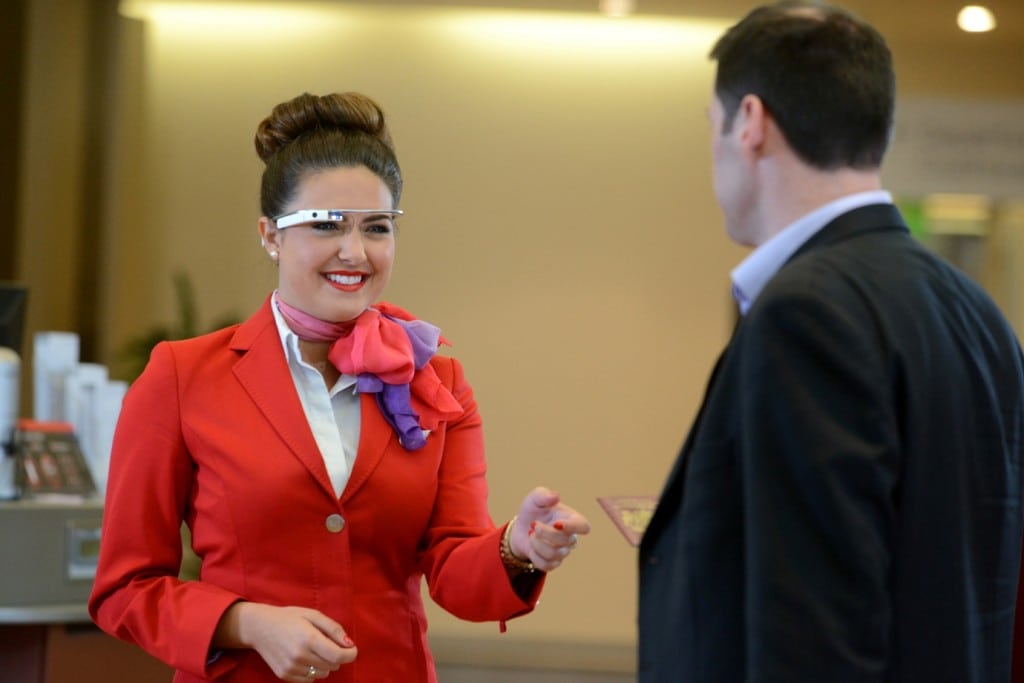Skift Take
Will airports and other places where customer service and its relationship to information end up being the perfect place for these Google face computers? It's a use case that makes sense to us.
Speaking to attendees at SITA’s IT Summit in Brussels this past week, Craig Kreeger, CEO of Virgin Atlantic Airways, had a confession about wearable tech.
He said that the airline looked at but decided against smart-watches and smartphones in favor of Google Glass for their concierges because both the smart-watches and smartphones made personnel appear distracted when attending guests. As he said, an attendant checking a smart watch for information to provide a passenger came across as impatient because we naturally associate someone looking their watch as eager to move on to something more important.
The smartphone also gave the impression that the customer service representative had something better to do.
“It was about giving staff better information and freeing them up to be with customers,” he pointed out speaking of the tech trials the airline conducted. Only Google Glass permitted the airline’s representatives to maintain the critical eye contact which demonstrated they were engaged and interesting it helping.
There were side-effects. Some passengers were taken aback initially by Google Glass wearing concierges, but that was to be expected. Kreeger indicated that, on the whole, passengers responded well. In fact, many of the passengers were so fascinated by the device that they kept asking concierges whether they could try them on.
There are also some technical challenges to overcome. Virgin Atlantic confirmed they same issues experienced by others in aviation who have conducted trials using Google Glass, including, most recently, Copenhagen Airport, who named their test-program “Service with a Wink.” (It’s officially translated from the Danish by the airport in their English press announcement as “service with a smile,” but loses something of the clever allusion to Google Glass in the translation.)
Both Virgin Atlantic and Copenhagen Airport, according to SITA Lab representatives, found that the battery life is too limited when it is actively used during a standard work day by airline and airport staff, that the scope lens of Google Glass is at a disadvantage because of its inability to zoom-in at an adequate range for some way-finding applications, and that the connectivity of Google Glass on networks can be glitchy.
The fragile nature of the device was also problematic, and because it cannot easily be folded and must be held in a larger carrying case it is cumbersome to tote around when not working. Most worrying, were claims by Virgin Atlantic, Copenhagen Airport and SITA Lab that the battery on the device heats up after extended use.
None of this seems to have turned Virgin Atlantic, Copenhagen Airport, or SITA Labs against Google Glass. Kreeger confirmed that the airline will be permanently adopting Google Glass (in very limited quantities) after “successful” trials at Heathrow.
Marie-Louise Lotz, Director Customer Care, Copenhagen Airport, said of their Google Glass experiment, which was limited to two members of staff: “We found Google Glass very easy to use and more user-friendly than other devices such as tablets..because the devices are hands-free, our managers are not focusing on a screen and can engage better with our passengers.”
However, the airport has made no commitment to Google Glass, and indicates it is investigating how they might use wearables in future.
SITA had to pay $1,500 per unit for Google Glasses they gave out for Virgin Atlantic and Copenhagen Airport to try-on for size. Like the public at large, they also had trouble getting their hands on them. They were originally only given two pairs by Google, but managed to buy more units thanks to the Virgin Atlantic trial, for a total of twelve, of which they still have nine left to give out to test-programs.
SITA Lab’s Director, Renaud Irminger told Skift that they have documented the issues with the device and will “do some troubleshooting.” He added: “As Google Glass improves it will be even better,” but noted, “it needs to be less fragile.”
During a Press Briefing, SITA Lab introduced two alternative Glass devices also being trialed for their potential applications for customer service and operations for airlines and airports.
We tried the Epson Moverio BT-200 on for size, and found the “transparent” full screen projected by the stereoscopic lenses disorienting. SITA points out that, because it functions more like a tablet computer and can run standard applications (thumb-dialed on a phone-control linked to the glasses by wire), it could useful for other applications–such as allowing hosts at airports to check VIP passengers in outside the traditional counters. It’s possible. We just wouldn’t want the job.
More promising was the rugged Vuzix M100, which, according to SITA, perform well and could be deployed to airline and airports operations personnel who do more hands-on jobs, where tech hardware must be more resistant to damage. The camera on Vuzix also has a better zooming capability, we were told.
None of this is the point of the trials, in any case. The limited numbers of units deployed, even after Virgin’s commitment, reflects that these trials are far more about marketing aviation as modern than it is about actually modernizing it. It takes more than rose-colored Google Glasses to do that.
Video: Stephane Cheikh of SITA Labs Explains Wearable Tech Trials
The Daily Newsletter
Our daily coverage of the global travel industry. Written by editors and analysts from across Skift’s brands.
Have a confidential tip for Skift? Get in touch
Tags: google glass, sita, wearables
Photo credit: Virgin Atlantic employees during a trial run of Google Glass. Virgin America
